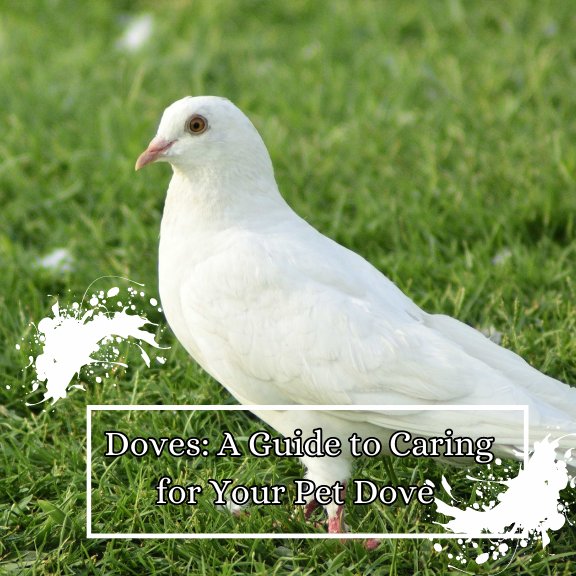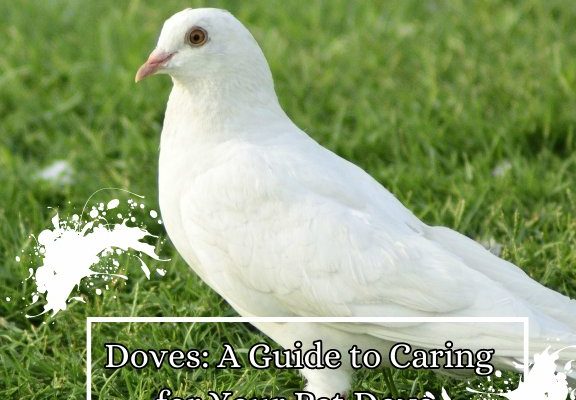
Getting started can feel overwhelming, but don’t worry! Just like learning to play an instrument or mastering a new recipe, dove care is all about breaking things down into manageable parts. Whether you’re considering a ringneck dove or a mourning dove, knowing how to create a healthy and happy environment for your new pet is key. So, grab your coffee, and let’s dive into the world of dove care!
Creating a Comfortable Home for Your Dove
One of the first things you’ll need is a cozy home for your dove. Think of it as setting up a little apartment for your feathered friend. Doves need a safe, spacious cage that allows them to move around freely. A good rule of thumb is to choose a cage that’s at least 24 inches wide and 18 inches deep. This gives your dove room to flap its wings and stretch a bit—just like we all need space to breathe and unwind.
When it comes to cage material, opt for one made of metal or sturdy plastic. Avoid cages with painted surfaces, as doves might nibble on them and ingest harmful chemicals. It’s also a good idea to place the cage in a quiet area of your home, away from direct sunlight and drafts. Doves prefer a calm environment, which helps them feel secure.
Decorate the cage with a few perches made of natural wood—this encourages natural behavior and gives your dove a place to rest. You might also consider adding a small, secure nesting area. Doves love to snuggle in cozy places, much like how we enjoy a comfy blanket while watching a movie!
Feeding Your Dove: The Right Diet
Now that your dove has a cozy home, you’ll want to think about what to feed it. Doves are granivores, meaning their diet mainly consists of seeds. However, it’s important to provide a balanced diet to keep them healthy. A high-quality dove seed mix is a great start, but you can also include fresh fruits and vegetables. Think of it as a colorful salad bar for your dove!
Some safe fruits and veggies for doves include:
- Spinach
- Carrots
- Peas
- Apples (just avoid the seeds!)
- Blueberries
Make sure to wash any produce thoroughly and chop it into small, manageable pieces. Doves have small beaks, so they appreciate bite-sized meals. It’s also important to provide fresh water daily—just like we need our hydration! Change their water every day to keep it clean and fresh.
Socialization: Building a Bond with Your Dove
Doves are social creatures, so it’s crucial to spend time with them. Think of your dove like a new friend—it needs your company to feel comfortable and thrive. Allow your dove to get used to your presence by talking to it gently and spending time near its cage.
Once your dove feels safe around you, you can start offering small treats from your hand. This helps build trust and creates a positive association with you. You might even be surprised by how quickly your dove warms up to you! Doves can learn to recognize their owners and respond to their voices.
If you’re planning to keep a single dove, consider spending a lot of quality time together. If possible, you might think about adopting a pair, as doves are happiest with companions. This way, they can socialize with each other when you’re not around, just like how we enjoy hanging out with friends.
Health Care: Keeping Your Dove Happy and Fit
Just like any pet, your dove’s health is a top priority. Regular check-ups with a vet specializing in birds can help catch any potential issues early. Make sure to look for signs of good health—shiny feathers, bright eyes, and a cheerful demeanor indicate your dove is feeling great!
Doves also need regular exercise outside their cage. Letting your dove out in a safe, enclosed space allows it to stretch its wings and exercise. Just make sure the area is free from hazards and that you can supervise it. This is similar to how we need to get outside and move around to stay healthy and happy!
Additionally, keep an eye out for common health concerns, like respiratory issues or feather plucking. If you notice any unusual behavior, like lethargy or changes in eating habits, it’s best to consult with a vet—better safe than sorry!
Understanding Dove Behavior
Understanding your dove’s behavior can help you connect even more. Doves often express themselves through soft cooing sounds and body language. For example, if your dove is bobbing its head or preening its feathers, it’s a good sign it’s feeling relaxed and content.
On the flip side, if your dove seems to puff up its feathers or hide, it might be feeling scared or unwell. Learning the nuances of dove behavior is like picking up a new language. The more you observe, the better you’ll understand how your feathered friend feels.
Another thing to consider is that doves can be quite vocal! Their peaceful cooing can fill your home with a calming energy. However, if the noise ever becomes too much, you can help train your dove to be quieter by giving it attention when it’s calm, reinforcing the behavior you want to see.
Common Challenges and How to Solve Them
Even the best pet parents face challenges. One common issue with doves is that they can be a bit skittish, especially when first introduced to a new environment. If your dove seems nervous, try to keep its surroundings quiet and predictable. Creating a consistent routine—like feeding at the same time every day—can help soothe its nerves.
Another potential problem is feather plucking. This can happen if a dove is stressed or bored. Providing plenty of toys and enrichment activities can help keep your dove mentally stimulated. Think of it as giving your pet its own little gym to play in! You can use simple items like paper towel rolls or safe, chewable toys to keep it entertained.
Lastly, if you notice your dove isn’t eating well or seems lethargic, don’t hesitate to reach out to a vet. Early intervention is key, and sometimes all it takes is a little professional guidance to get your feathered friend back on track.
Wrapping Up: Enjoying Life with Your Dove
Caring for a pet dove can be a truly rewarding experience. It’s about building a relationship rooted in love, understanding, and a little extra effort. Remember, doves thrive in a nurturing environment where they feel safe and engaged. So, whether you’re helping your dove settle into its new home or sharing some tasty treats, every moment counts.
Just think of your dove like a little family member. As you learn more about its needs and behaviors, the bond you share will deepen. So, bring on the coos and cuddles! You’re well on your way to providing a happy, healthy life for your pigeon buddy. Enjoy the journey, and remember, every day is a new opportunity to learn and connect with your delightful feathered friend.

